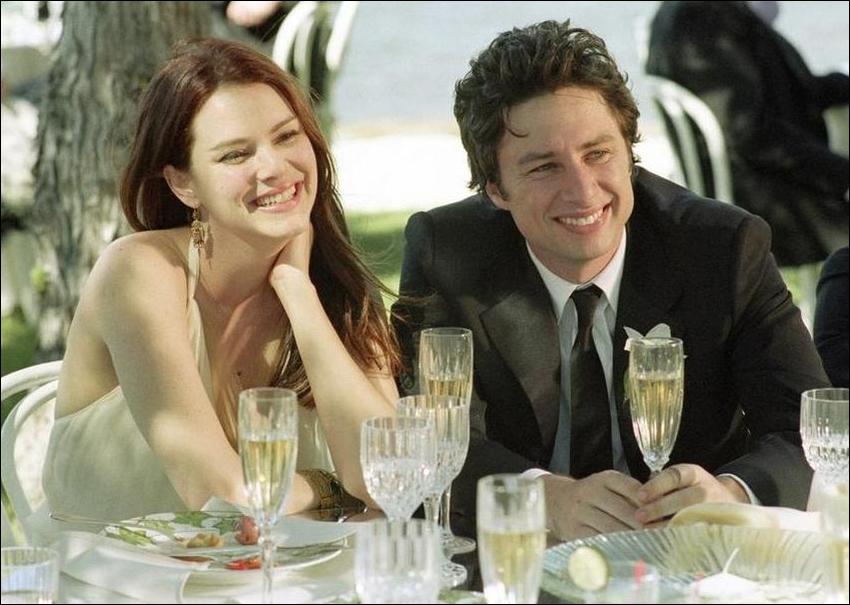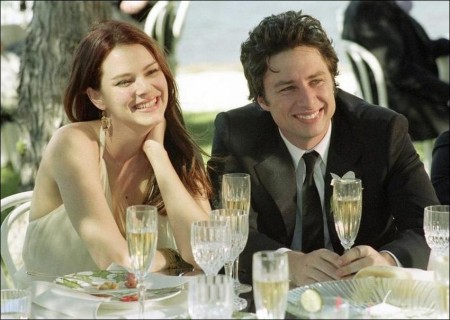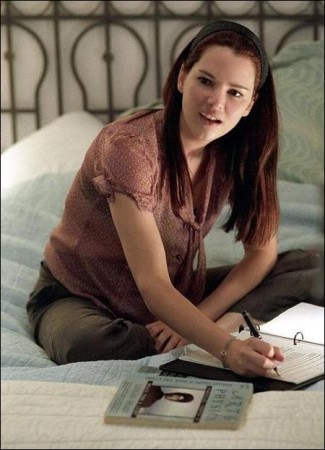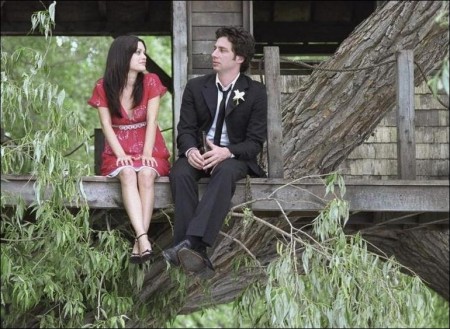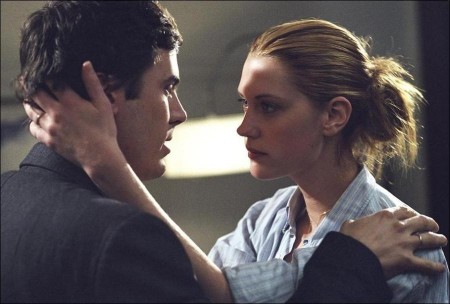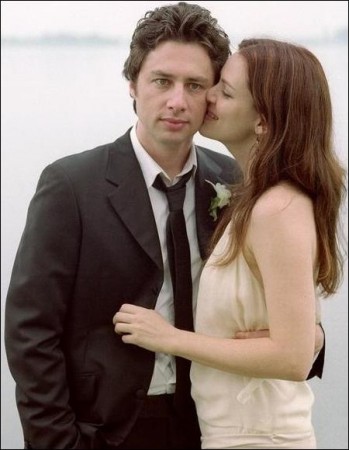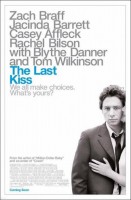Tagline: We all make choices. What’s yours?
“The Last Kiss” is a contemporary comedy-drama about life, love, infidelity, forgiveness, marriage, friendship… and coming to grips with turning 30. It is an adaptation of Gabriele Muccino’s acclaimed Italian film “L’Ultimo Baccio.”
For Zach Braff, star of the new film “The Last Kiss” from DreamWorks Pictures and Lakeshore Entertainment, the film seemed to be a natural progression from his role in his acclaimed film “Garden State.” “Whereas ‘Garden State’ was about being lost and confused in your mid-20s, this film is about being lost and confused as you turn 30,” says Braff. “The film is about turning a major corner in your life: settling down and starting a family, while still clutching on to everything that was free, innocent, and fun about being young.”
Tony Goldwyn, who explored similar themes in “A Walk on the Moon,” directs the film. “What we had the opportunity to do with ‘The Last Kiss’ was to make a comic drama about contemporary relationships that’s really funny, very sexy, and, most importantly, real,” enthuses Goldwyn.
“The screenplay takes a refreshing and rather edgy look at the ideals we have about what we imagine we want in our life partners, how we see our lives going, and what we expect to achieve at various stages of our lives. Somehow life never works out like ideal we envision. What do you do when life happens to you?”
“The Last Kiss” began life as the Italian film “L’Ultimo Bacio.” Nominated for 10 Davids (Italy’s Oscar), including Best Film, and winner of five, the film had a profound effect on Lakeshore Entertainment’s Tom Rosenberg and Gary Lucchesi. “Two people told me about the Italian film in the same week – in fact, one was Jacinda Barrett, who would have a role in ‘The Last Kiss,” recalls Rosenberg. “I thought of it as a coming of age film.
When I was a kid, people faced adulthood at 20 or 21, but these kids in the movie are 29 going on 30, which I think is the new coming of age; it seems there’s a bit of a prolonged adolescence today. ‘L’Ultimo Bacio’ dealt with a lot of issues young people face, but no one ever talks about, or they talk about in an idealized, silly way.” “I loved ‘L’Ultimo Bacio,’” says Lucchesi, “and unlike many foreign films it seemed to lend itself naturally to an American remake. I found the subject matter really fascinating and the content to have an American style to it.”
Once Lakeshore had acquired the rights to the Italian film, the next step was to develop the screenplay. “Paul Haggis was really the key,” adds Lucchesi. “We’d worked with Paul before on the Lakeshore film ‘Autumn in New York’ and we thought he’d be perfect for this material. We were right. He adapted the screenplay for us and really nailed it. Subsequently, through our relationship with Paul, we heard that he’d written this movie ‘Million Dollar Baby’ that couldn’t get financed. So we got involved with that picture and, of course, it was a big Academy Award-winner, including a Best Picture Oscar.”
“For ‘The Last Kiss,’ I was most interested in what our lead character, Michael, was going through,” explains Lucchesi. “That was something that I could relate to from a first hand point of view. Also, as a father of two daughters, I imagined what kind of scene would occur if a father had to encounter a future son-in-law who had cheated on his daughter. I thought that would be a very interesting and sort of remarkable encounter.
“I also loved the message,” continues Lucchesi. “Temptation is all around us; it’s how we deal with it and what lessons we’ve learned in the past that’s important. Quite often, we have to learn those lessons on our own. We can get advice from other people, but the advice they offer they’ve learned from the experiences that they have had.”
To direct the film, the producers turned to Tony Goldwyn, who had previously shown a light touch and sensitivity with similar themes in his 1999 movie, “A Walk on the Moon.” “Tony really responded to the screenplay,” recalls Rosenberg. “Gary and I thought he was the perfect choice for the material; when you meet him, he’s an intelligent, well-constructed, mature individual, and still an active actor, which is invaluable for an actor’s piece like ‘The Last Kiss.’ Each director comes with certain strengths – knowing how to direct films in a way that actors can appreciate is definitely a major strength for Tony.
“I loved ‘A Walk on the Moon,’ Tony’s first feature as a director,” enthuses Lucchesi. “I thought it was a magnificent movie, with terrific performances – it dealt with infidelity in a very kindly and elegant way. I think you could say the same thing about the Diane Lane character that you could about Michael, the Zach Braff character, in our film – her affair taught her something about herself and how to embrace her future with her husband. Tony had the tools that made him perfect for dealing with our story and characters.”
“When I directed ‘A Walk on the Moon,’ I had never directed before, and in fact, I never had any ambitions to direct,” says Goldwyn. “I thought I wanted to produce and I found that film, but couldn’t get a director that I thought was right. I ended up directing it just to get it made and then discovered, wow, this is the greatest job I ever had. Coming into the job an actor, I thought to myself, ‘What kind of atmosphere would I, as an actor, want on the set in order to do my best work? I tried to emulate that and that’s how I direct.
Coming onto ‘The Last Kiss,’ Goldwyn was impressed by the ways that Paul Haggis’s screenplay adaptation presented its flawed characters with compassion and humanity. “What I loved about the script is that there are so many different facets to it,” says Goldwyn. “The characters all have relationship issues, but we see them from both sides of the equation. That’s always something that’s really important to me in storytelling – that there are no good guys or bad guys. Rather, there’s a very balanced perspective, so both people in a relationship are right and both are flawed. The film doesn’t focus on just the male perspective or just the female perspective, but on the human perspective.”
“Although ‘The Last Kiss’ is a film about relationships, it’s also about friendship,” Goldwyn continues. “All of these guys are each other’s lifeline – they’ve known each other since nursery school. At this transitional point in lives, as they’re turning 30, and moving off into having other people be the primary person in each of their lives, they rely on each other as an anchor, as a refuge.”
Casting The Film
From the very beginning, the filmmakers saw “The Last Kiss” as an “actor’s film,” one that was filled with interesting roles that attracted the interest of some of the finest young talents. As Goldwyn recalls, “When we were casting the movie, the actors in their 20s that we saw said to me, ‘It’s so amazing to read a script that is honest about what it’s like for us trying to figure out this relationship thing.’ They told me they’d never read a script that doesn’t cutesy it up, idealize it, or dump on it. It reinforced that we could make a film that is a very loving, but painfully honest look at the ridiculous struggle.”
For Goldwyn, casting was essential – the actors they hired would determine what the final film would be like. “There’s sort of a group of 29-year-old guys who are out there in our pop-culture actor sphere,” explains Goldwyn. “But every time a name was brought up, the actor just didn’t seem right to me. And then when Gary and Tom mentioned Zach Braff, I said, ‘That’s the movie you want to make.’”
The reason for that, according to Rosenberg, is that Braff is an actor who is adept at eliciting sympathy from the audience. “It was a difficult line for Zach to walk in the role and he does things that audiences normally won’t forgive,” comments Rosenberg. “Michael has to be likeable and sweet, but without saccharine. There aren’t many actors who could do this role; Zach knew it was a great role for him and he played it perfectly.”
In fact, Braff was the first choice from the very beginning. “He’s a very interesting actor,” Lucchesi says. “The role calls for him to be funny with the guys and charming with women, but also serious, focused, tender, loving, and committed in his scenes with Jenna. Zach is absolutely convincing.”
Goldwyn says that casting Braff helped him frame his vision of what the film would be “Zach Braff gives the film an identity in terms of reality,” he says. “He’s a real person; he also has a very distinct kind of wit and sense of humor, as well as intelligence and an offbeat quality. He makes you feel that there’s a real guy on the movie screen, but of course, he’s still a leading man.”
Braff was particularly drawn to the ways the role rang true to real life. “I just turned 30 and was starting to ask the same questions of myself that Michael asks: what do I want my 30s to be like? How do I imagine my life going? The characters in this film are all in a period of self-examination. I think all of us in the cast found something in common with the characters we played.
“Michael’s in love with his girlfriend and has great friendships, but he’s a little afraid the surprises are going to stop coming in his life,” Braff continues. “He’s terrified that the rest of his life is going to be programmed out according to all the societal conventions. When he panics and runs back to the freedom and innocence of being in 20s, he finds that choices have consequences didn’t exist five years earlier.”
One key to the role, for Braff, was making each relationship in the film seem real. Not least of these was the relationship between the four guys: Michael, Chris (Casey Affleck), Kenny, and Izzy (Michael Weston). “These four guys have known each other forever – when I talk about ‘The Last Kiss,’ I often describe it as a modern-day ‘Diner,’ a film about a group of friends at a crossroads who are all going through the same thing,” says Braff. “It was important for the four of us to bond, and it was easy, because all of us got along so well.”
Braff felt it was equally important to portray a real relationship with the two women in his life – Jenna, the mother of his child, and Kim, the woman with whom he has an affair, played by Jacinda Barrett and Rachel Bilson, respectively. “With Michael and Jenna you see that there is this great love, companionship, best friendship; you see that Michael wants to spend the rest of his life with her,” explains Braff. “With Kim, Michael is swept away by a fleeting obsession. For me, that’s what the movie is about: navigating and negotiating between two very separate emotions as one enters marriage.”
A director himself – the actor’s first feature, “Garden State,” was well-received by critics and audiences alike – Braff has the highest of praise for Tony Goldwyn. “Coming from the theater, Tony loves to rehearse his actors. He’d encourage us play with ideas – ‘Let’s try it ten different ways; these are my thoughts, but what do you think?’ “Because Tony’s also an actor, he really knows how actors like to be talked to,” Braff continues. “That is, actors love to feel like they’re collaborators in the movie and not just chess pieces. Tony manages that better than anyone I’ve ever worked with.”
Once Braff was cast, the filmmakers set about the lengthy and complex task of casting the other key roles in the large ensemble cast. In addition to selecting the right Jenna and Kim to play the women in Braff’s character’s life, the filmmakers had to come up with the right group of guys who an audience could believe were friends for life, as well as the girls with whom each of them is involved.
For the role of Jenna, Michael’s longtime girlfriend and the mother-to-be of his child, the filmmakers selected Jacinda Barrett. Rothman and Lucchesi had worked with Barrett before, on their film “The Human Stain,” and thought the actress would bring the right mix of sympathy and resolve to the role.
“Jenna is a very difficult part,” emphasizes Goldwyn. “We cast Jacinda because as a leading lady, she could give a performance that was both emotionally vulnerable but also credibly angry. Jenna also has incredible comic timing; she has to play her part in a way that’s convincingly both funny and angry. Jacinda pulled that off beautifully.”
“I was in Cambodia on my honeymoon when I got the call they needed me to come in for a reading right away,” says Barrett. “I remember reading the script on the plane and thinking, ‘Oh my God, it’s so good. This role is so special,” recounts Barrett, “It just felt like it was really right, like it was going to happen.”
“The role of Jenna was just a dream as an actor – there are so many colors to the role,” Barrett continues. “There are light moments as well as the heavily dramatic. There’s the romantic and the heartbreaking, as well as incredibly ferocious anger and pain.”
“Whenever you play a character, you put yourself in her place and go to whatever emotional place she’s going to,” relates Barrett. “For instance, there’s a big scene where Jenna’s waiting for Michael to come home; I had to break down. I felt awful afterward because of all the crying and screaming, but I had to just fully believe the truth of that situation.”
Barrett says that playing the daughter to Blythe Danner and Tom Wilkinson was a fulfilling experience. “You never know what it’s going to be like, but it was perfect casting,” says Barrett. “The two of them together were so amazing. Blythe is funny and emotional, and Tom is so witty and, in his character, so grounded and loving. I thought to myself, ‘They really could be parents.’”
Almost simultaneously to casting Jacinda Barrett, the filmmakers chose Rachel Bilson for the role of Kim, the other woman in Michael’s life. For Rachel Bilson, best known for her starring role on the hit TV series “The O.C.,” the part fit perfectly. “I thought the screenplay was great, really well written,” recalls Bilson. “And I loved the character of Kim. I got to play her really sweet, funny, young and carefree, just having a good time, but there are feelings and emotions that she experiences – this is a pivotal time in her life. Who could ask for anything more in a character?”
“The stereotypical way to cast the role would have been to go with some incredibly hot, sexy bimbo little girl, who was simply a sexual siren,” says Goldwyn. “Rachel Bilson is an incredibly sexy, beautiful young woman, but she also has so much intelligence, wit and substance to her,” says Goldwyn. “She brings great validity to the attraction Michael has to Kim as well as making a choice between the two women more difficult. You believe that he can entertain the thought that maybe he should go with this person because she’s so young, exciting and idealistic. She fits the entire fantasy, not just the sexual fantasy.”
“Making Kim very likeable is what I was striving for,” says Bilson, “It was important to all of us to make the movie realistic. Kim pursues Michael in a completely innocent way – she’s not a seductress at all.”
Bilson says that the role was much closer to her own personality than any she’s played before. “When I first read the part of Kim out loud with my friends and later in the audition, it was so natural; the character was so like me. It was cool to play a part that’s a little bit closer to me than my role in ‘The O.C.,’” enthuses Bilson. “Although I’m 24, a few years older than Kim, I play a high school girl on the TV show, and Kim’s a little older and smart and funny. She’s somewhat naïve because she’s still very young, and she’s a character who experiences her first broken heart. Nobody wants to relive that, but to be able to do that as a character was good work.”
In addition to the women, Michael is surrounded by his best friends – they are a quartet that has known each other since pre-school. With Braff cast in the lead role, the filmmakers sought to cast three actors around him who one could believe would be his life-long friends. They found Casey Affleck, Michael Weston, and Eric Christian Olsen. In addition, the complex story required each of these men to have a woman in his own life; for these roles, the filmmakers cast Lauren Lee Smith, Marley Shelton, and Cindy Sampson.
Affleck plays Chris, who has just had a baby with his wife, even though their relationship is on the rocks. The actor was attracted to “The Last Kiss” by his character; Affleck himself had a one-year-old baby and found that the character struck a chord. “I thought it was a really interesting dilemma Chris finds himself in,” he says. “Although the movie has a bunch of different story lines and relationships, this one seemed to me the most interesting. It was particularly compelling to me because there was no easy solution.”
Affleck says that a relaxed atmosphere on the set was the key to presenting the friendships as real. “There definitely was some chemistry between the four of us,” he says. “We just clicked – whether it was great casting or lucky casting, there was no stress between us. It was definitely fun acting opposite Zach; he has a really easy feel, with an acting style that’s naturalistic and relaxed. He was very easy to work with and a lot of fun to hang with. Even Jacinda, Rachel, and Lauren fit in with everyone else comfortably; it wasn’t just the guys – it was the whole group.
Affleck believes director Tony Goldwyn was very helpful to all the actors, beginning with the rehearsals a week before filming. “Tony’s focus as director seems to be telling the story through each role, through carefully manufactured moments of acted drama,” observes Affleck. “He said something to me that I found very helpful in my confrontational scenes with Lauren: ‘Instead of playing the heightened emotion of those scenes,’ he said, ‘just try to care only about communicating to the other person the thing you most want to say.’ I’m sure that’s something he learned as an actor, and it’s something I took with me from rehearsal.”
Michael Weston was reunited with Braff – his former roommate and ‘Garden State’ director and co-star – when he was cast in “The Last Kiss.” “I knew Zach was on board and I thought it would be great to play his buddy in something since we have a natural rapport as buddies in real life,” he says.
“As for my character Izzy, when I read the script I immediately knew I had to play that role,” says Weston. “As an actor, you don’t let yourself fall in love with a part before you audition – so often you get disappointed. But with this one I said, ‘Uh, oh, I’m in deep already.’ I just loved the character.”
What Weston liked most about Izzy was that he was such an “anti-male movie hero guy.” As Weston explains, “He’s not the kind of character who’s strong and silent. He’s full of emotion and erratic in his behavior. And yet a lot of it’s very justified. Izzy’s the man in tears who gets dumped by his girlfriend and then has to reassess his life.” Given Weston’s friendship with Zach Braff, Weston thoroughly enjoyed doing another film with him. “Working with Zach was great,” says Weston. “We share each other’s timing and sense of humor; it was so easy playing friends. It was also great getting to know the other guys – we spent a week doing rehearsals, but mostly hanging out. It was funny how everyone sort of fell into their characters. You never really know with actors whether they’re pushing at that or if that’s who they really are. But I started to get to know these guys and we had immediate camaraderie. I think that really shows on screen.”
Eric Christian Olsen plays Kenny, the character that, perhaps, expects the least out of his relationships with women. “I thought Kenny was a part I could really do a lot with,” says Olsen. “Of the four friends, Kenny’s the one who doesn’t believe in the idea of one woman for the rest of his life. I think his philosophy has more to do with living life in the moment and the only thing that matters is that moment that you’re living in. It’s ‘love the one you’re with.’ “I think if Kenny ever makes a decision to be with one girl for the rest of his life,” elaborates Olsen, “it will be because he’s seen the rest of the world and he knows this is the person for him. That’s not in the script, but I had to play it like at some point that’s a possibility for him, because he never throws it out the window.”
Like his fellow actors, Olsen praises Goldwyn’s perspective as an actor-cum-director. “When I first went up for the role I read Paul Haggis’s script and thought it was phenomenal,” relates Olsen. “And then when I met Tony I knew it was in the right hands. He’s so good at communicating what he sees as the vision of the character, the scene and the story as a whole.”
For the final piece of the casting puzzle – Jenna’s parents, Stephen and Anna, who are going through their own relationship issues – the filmmakers turned to two award-winning actors: Blythe Danner and Academy Award nominee Tom Wilkinson.
“There was something about the rites of passage, of people about to commit to big time relationships which struck a chord in me,” explains Wilkinson. “I don’t want to get autobiographical about this, but some of the incidents in the script were not too far away from my own experience. That was very attractive to me. Of course, that’s very compelling if you’re an actor, because you can call upon your own experience. The ramifications are rich and useful.”
“From the very first time I read the script, I imagined Tom Wilkinson as Stephen,” says Goldwyn. “He’s a very quiet presence, but there’s so much going on inside of him. He’s very warm and loving; as a result, there’s a huge heart under his character’s sarcastic exterior.”
As his daughter is facing a crisis in her relationship with Michael, Wilkinson’s character, Stephen, has to confront the disintegration of his own marriage. “Stephen, a psychiatrist, uses irony as a sort of character armor,” he says. “It’s something he uses to avoid the conversations with his wife that he should be having. He has a habit of mind to withdraw and not put his own feelings on the table in his marriage. That’s what produces the kind of disconnect that he and Anna experience during the course of the movie.”
The lessons Stephen learns become important advice for both his daughter and her boyfriend. “One of the things that the film is saying is that relationships need to be worked on. Once you start taking each other for granted, danger signals can ring,” says Wilkinson. “Forgiveness clearly is part of the human condition and is what all of us should aspire to. In Stephen’s case, he comes to recognize his own responsibility for what Anna’s done. I think that once he takes responsibility for his role in this whole thing, then he at least understands her. As the phrase goes, ‘To understand is to forgive.’”
“Anna’s a complicated woman,” explains Danner. “We see her only briefly, but we’re exposed to her toxicity, vulnerability, and warmth. She’s a wonderful character. For example, when Jenna tells Anna, her mother, that she’s pregnant, Anna’s reaction is complicated. They’ve been living together for three years, so it’s not a shock, but despite being a fairly together and mature woman, she doesn’t really handle it all that well. There’s a bit of jealousy, especially when it comes to her daughter’s close relationship with her husband, and I don’t think Anna likes that she feels that way. She represses it, but it emerges again.”
For Danner, having the opportunity to work with Tony Goldwyn was particularly welcome. “I’ve known Tony since he was 10 years old,” relates Danner. “It’s been wonderful to see him grow into first a beautiful actor and then a talented director as well. In fact, my husband and I are somewhat responsible – Tony came to the Williamstown Theatre Festival many years ago and we helped him get his start in the acting company there. So, it was lovely to work with him on ‘The Last Kiss.’ He understands what we go through as actors and fine-tunes beautifully. That’s the fun of acting – every actor hungers to make it better and explore and show all the colors that are supposed to be there. So many things get missed when directors don’t explore those areas. Tony definitely does and it makes an actor feel really valued because then you’re part of the process.”
“There’s so much complexity to everything Blythe does,” says Goldwyn. “If she’s in an aggressive fight scene, she’ll find a way to bring in her character’s love for the other person. Those opposites show her characters’ fragility and strength and make her performances very meaningful.”
About The Soundtrack
After winning a Grammy Award for compiling the soundtrack to his own film, “Garden State,” Zach Braff was approached by the filmmakers with the idea of putting together the music for “The Last Kiss.”
“Tony was really open to the idea,” says Braff, “so while we were filming, I started making mix CDs for him – five or six in total, just filled with songs – and little by little, as he started cutting the movie, he started placing them here and there.”
The resulting soundtrack, which is produced by Braff, is an eclectic collection of songs from indie pop artists ranging from Coldplay to Imogen Heap to Snow Patrol to Joshua Radin. Nine songs suggested by Braff and chosen by Goldwyn are in the film and several more are on the soundtrack.
One song in particular that spoke to the filmmakers is “Chocolate” by Snow Patrol. “In many ways, it’s the theme of the movie,” says Braff.
For a song that describes the relationship between Michael and Jenna, Braff points to a song not in the film, but on the soundtrack: “Arms of a Woman,” by Amos Lee. “The lyric is, ‘I am at ease in the arms of a woman / but most of my time I spend alone.’ I think that’s a good way to articulate what happens to them because they’re so at ease with each other; they’re a perfect match. When he finds himself alone, lonely, and in pain, he’ll do anything to get her back.”
For one particularly poignant sequence in the film, Goldwyn and Braff chose Imogen Heap’s “Hide & Seek.” “At the end of the sequence, all the characters are saying goodnight to each other,” says Braff. “It’s the end of a chapter in the film. The way the images work with the song is so powerful. It’s sung a capella and synthesized; it’s heartbreaking.”
Joshua Radin – Braff’s close friend – provides two songs for the soundtrack. The first is “Star Mile,” which plays over the end credits of the film. “‘Star Mile’ sets the perfect tone to end the movie,” says Braff. “The movie ends without a whole lot of answers; there’s a lot that’s implied. There’s something about Josh’s song that sums it up.” Radin wrote “Star Mile” specifically for the film. “One of the things that struck me was how similar the themes of ‘The Last Kiss’ are to the themes of ‘Garden State,’” says Radin. “I think the idea that there are no surprises left once you hit 30 is common among guys. No matter how good it is, the grass is always greener – it’s hard to be content with what you have. That’s what the song is about.”
Radin’s other song – and final song on the soundtrack –is “Paperweight,” which the artist performs with Schuyler Fisk. Although not in the film, Braff felt that the song caught the themes of the film. “The song is about the power of love and love finding its way through a lot of nonsense,” says Braff.
“Paperweight is the first song I’ve ever co-written,” says Radin. “All my other songs, I wrote by myself. When Schuyler and I met and started dating, I played her the melody for ‘Paperweight’ – I wasn’t really sure what it was going to be, and I thought it would be a good experiment, to see what it would be like to co-write a song.” “I wrote the lyrics that night,” says Fisk. “I sat there with my headphones on, listening to the melody over and over, and the lyrics just poured out. I was so nervous! It’s been a great experience because Josh and I are so close – this song means a lot to us and it’s fun to play.”
Braff, concluding, explains why the song takes the last spot on the soundtrack: “Though the soundtrack as a whole has harder songs, slower songs, romantic songs, and angry songs, I wanted to end the whole thing on a very sweet love song – just like we want all our relationships to end up.”
These production notes provided by DreamWorks Pictures.
The Last Kiss
Starring: Zach Braff, Jacinda Barrett, Casey Affleck, Michael Weston, Eric Christian Olsen, Rachel Bilson, Blythe Danner, Lauren Lee Smith, Marley Shelton
Directed by: Tony Goldwyn
Screenplay by: Paul Haggis
Release: September 15, 2006
MPAA Rating: R for sexuality, nudity and language.
Studio: DreamWorks Pictures
Box Office Totals
Domestic: $11,614,790 (73.6%)
Foreign: $4,160,689 (26.4%)
Total: $15,775,479 (Worldwide)
